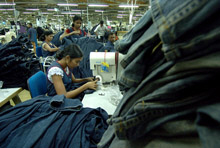
Typical street scene in Santa Ana, El Salvador. (Photo: iStock)
IMF Survey: Sri Lanka to Use IMF Loan to Reform Economy After Conflict
July 29, 2009
- Rebuilding Sri Lanka’s reserves key to avoiding crisis
- IMF program to help support post-conflict reconstruction efforts
- Protection for poor, assisting the most vulnerable are key goals
The IMF has approved a 20-month Stand-By Arrangement for Sri Lanka providing the South Asian island nation with a $2.6 billion loan to help reform the economy following the end of its extended conflict.

Sri Lankan workers in garment factory. The garment industry is a key sector in the Sri Lankan economy, which has suffered as a result of the global financial crisis. (Photo: Newscom)
Global Financial Crisis
The government has formulated a program aimed at restoring fiscal and external viability and addressing the significant reconstruction needs of the conflict-affected areas. The IMF staff supports this program, specifically the government’s goals of rebuilding reserves, reducing the fiscal deficit to a sustainable level, and strengthening the financial sector. It is also essential that the program cushion the most vulnerable from the needed adjustment.
In an interview, IMF mission chief Brian Aitken talks about the circumstances leading to Sri Lanka’s current economic problems and how the new IMF program will help get the country’s economy back on track after the end of its 26-year conflict.
IMF Survey online: Why does Sri Lanka need an IMF-backed program? How did the country get into economic problems that required the IMF’s assistance?
Aitken: Sri Lanka had been running high budget deficits for several years and had borrowed to finance these deficits internationally on short terms. This left the country exposed to a sudden reversal of this borrowing. When the global financial crisis hit, there was a sudden stop in financing from international markets and the central bank intervened to prevent the exchange rate from depreciating. This, in turn, put pressure on Sri Lanka’s international currency reserves, which still remain at very low levels.
IMF Survey online: It took many months to reach an agreement on the loan. What was the sticking issue?
Aitken: As with other countries that seek financial assistance from the IMF, there is no one-size fits all approach. In negotiating the agreement with the Sri Lankan government, we needed to adequately take into account the unique circumstances facing the country. It is not unusual for this to take some time, as the program needs to be carefully designed.
IMF Survey online: What conditions will the IMF attach to this loan? Will higher taxes and spending cuts be required?
Aitken: The central objective of the government’s program is to reduce the fiscal deficit to a sustainable level of 5 percent of GDP by 2011. To accomplish this, the government has recently put in place a number of revenue enhancing measures and intends to introduce reforms to broaden the tax base and reduce tax exemptions beginning in the 2010 budget.
At the same time, it is important that the government maintains protection for the poor and funding for social services. Under their program they have maintained support for health and education and also support for the most vulnerable under their Samurdhi program, which is aimed at poverty alleviation.
IMF Survey online: How can you make sure that the IMF-supported program will protect Sri Lanka’s vulnerable population, who still suffer as a result of the conflict?
Aitken: To protect the vulnerable groups in society, the government’s social sector spending is targeted to increase to 7 percent of GDP in 2009 from 6.8 percent in 2008—this during a time of deficit reduction. In addition, the government also is taking action to provide immediate relief and expand social safety net spending to resettle the displaced persons in the North within the shortest possible time.
IMF Survey online: Where will the IMF's money go?
Aitken: The IMF’s money would go directly into central bank reserves, rather than financing budget expenditures. The program aims to rebuild international reserves while allowing flexibility in the exchange rate. This would provide a bit of a shock absorber to the real economy, thereby helping to reduce the size of the impact of adjustment on the real economy that would otherwise be needed. It would also help avoid a balance of payments crisis and allow a more gradual adjustment. It will preserve confidence and allow the country to sustain a higher level of growth over time.
IMF Survey online: How will the IMF help Sri Lanka with its post-conflict reconstruction?
Aitken: One of the main purposes of the program is to rebuild confidence, and thereby lay the basis for higher growth in the years ahead. This would certainly provide more resources to the government so they can engage in their important reconstruction effort. The program would provide a framework in which international donors can come in and help support the government’s considerable reconstruction needs over the next several years, including repairing and rebuilding infrastructure, roads, hospitals, and schools. The government is currently developing a comprehensive reconstruction strategy based on its experience gained during the reconstruction of the Eastern province that started in 2007.
IMF Survey online: How will the IMF disburse the money to Sri Lanka and what is the rate of interest on the loan?
Aitken: The government requested a 20-month Stand-By Arrangement with access of SDR 1,653.6 million (about $2.6 billion), which is equivalent to 400 percent of Sri Lanka’s quota. An initial disbursement of SDR 206.7 million (about $322.1 million) is made upon approval, followed by seven additional disbursements in an equivalent amount. The interest rate on this loan is currently less than 1½ percent per year. The program will be subject to quarterly reviews to ensure the program remains on track. Starting in September 2009, disbursements will depend on the completion of a review.
Comments on this article should be sent to imfsurvey@imf.org


